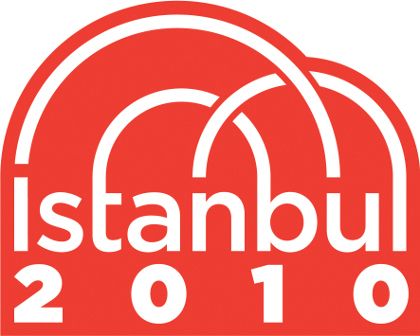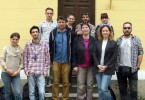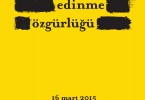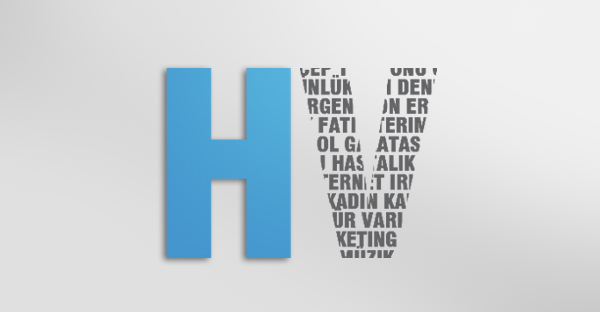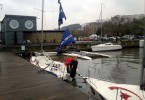Karen Schewina
“The greatest heritage we would transfer to 2010 proudly is gone forever”, states Halim Bulutoglu, member of the History Foundation of Turkey, in his resignation letter on 16th of November. He has his reasons to leave the Advisory Board (AB) of the European Capital of Culture (ECOC) Agency. One of them is the fact that “there is neither a structure nor somebody to stay behind the promises that we made enthusiastically in the beginning” of the long road for Istanbul to become one of the three cities being elected for 2010.
“Together with the opening celebrations on January 16th which will take place at six different locations across Istanbul, we have prepared a large and comprehensive program in cooperation with many culture-art organizations so that Istanbul residents can share this energy,“ declared Şekip Avdagiç, the Chairman of the Executive Board of Istanbul 2010 European Capital of Culture Agency at a press conference, but many who have resigned from the board disillusioned by the preparation process disagree that the event will go without a hitch.
The agency Bulutoglu says has become “bulky and functionless”, moving away from the ideas and ideals it was supposed to achieve. At the same time, Faruk Pekin from the Cultural Awareness Foundation declared his resignation from the agency, which was founded in 2007 by Prime Minister Recep Tayyip Erdoğan to coordinate the future activities and the relevant institutions in the preparation process. The agency has a coordination board composed of five ministers, an advisory board and an executive board.
Recently, Bulutoğlu and Pekin were the last ones to pull out of the board in a long line of NGO representatives who resigned earlier disillusioned with the policies of ‘officials’ sitting on the board with them.
In 2009, the agency has been shaken by several waves of resignations, protests and complaints, starting in February with the resignation of Professor Metin Sözen, Professor İskender Pala and Gürhan Ertür, along with the chairman of the executive board of the agency, Nuri Çolakoğlu. The main problem was reported to be disagreement about the future of ECOC and the public perception that the agency has not been able to develop significant projects in the proposed timeframe due to conflicts among the executive board of nine members.
Confusion rose, when Nuri Çolakoğlu, chairman of the executive board of the İstanbul 2010 European Capital of Culture (ECOC) Agency, founded to coordinate the activities to be held in İstanbul in 2010, stated on the 28th of February in Today´s Zaman that it was not true that he and three other executive board members resigned, but confirmed that there has been dissent among agency members and that they were trying to resolve it.
Despite this statement, in the beginning of March, 6 executive board members from the İstanbul 2010 European Capital of Culture (ECOC) resigned, as the Radikal daily reported on the 4th of March 2009.
Professor Metin Sözen, Professor İskender Pala and Gürhan Ertür, along with the chairman of the executive board of the agency, Nuri Çolakoğlu, announced their resignations during a Monday ECOC meeting. Şekip Avdagiç, representative from the İstanbul Chamber of Commerce (İTO), and Nuri Tuna, representative from the İstanbul Chamber of Industry (İSO), have also stepped down from their posts mentioning differences in opinion as the main reason. End of March, one of the major 2010 projects, a plan to gather famous authors in İstanbul, has been cancelled due to budgetary problems and the agency has been heavily criticized for its long project evaluation period during which it did not give any information to the creators of the projects about the process as in the case of the “Blind Photographers Project” initiated by Nuri Kaya in September 2008.
Complaining that he had not been able to reach the chairman of the agency for 311 days, Kaya said: “In November they told us that the project was approved and 70 percent of the cost would be covered by the agency, so we started to work. In the meantime, on March 31 a new board decision was released, narrowing the scale of the project and covering only 50 percent [of the costs]. Even though we made complaints no one listened to us. And in the budget commission meeting, the project was canceled by the agency.”
Speaking to Sunday’s Zaman, one of the founding members and the chairwoman of the initiative, Şule Ateş, said that recent problems within the agency were the reason for the interruption of the organization process because they resulted in the cancellation or delay of projects. Complaining about the lack of information provided by the agency regarding the projects carried out, she also noted that “a very small portion of the project’s main budget is allocated to those producing arts in the city.”
Demanding that “the opinions of evaluation and selection boards should be respected more,” she stated that the İstanbul 2010 ECOC was supposed to be a “civil, democratic and transparent project”. During the interview, which was published in Today´s Zaman on the 12th of April she explained that the model on which the agency is based, is the first attempt to bring ministry officials, local governments and NGOs together, and therefore different opinions and attitudes among these interest groups were most likely the cause of the problems.
Right now, the ECOC agency is, according to Butuoğlu in a “catastrophic state with respect to employment policies and job efficiency, as the issues of responsibilities, authorities, sanctions and promotions have never been determined”. It appears that “new employees have been hired sporadically, without any announcement or a screening of potential candidates, most of the time, based on political preferences.”
The Executive Board (EB) has excluded the Civilian Initiative Group, which was founded in 2000 and played an important role in the application process for the ECOC program, from their activities and of the agency in general. The Advisory Board (AB) is de facto not allowed to work properly: the important matters are neither put on the agenda of the AB nor is sufficient information given to its members. Bulutuoğlu describes the inclusion and participation possibilities of the AB members as “insufficient to relevant processes.”
Additionally, according to his information, decisions have been made contradicting the ECOC criteria and the Budget and Procurement Commission (BPC) is not providing any transparency about their decisions and financial situation in general. “There is no audit on administrative, financial or legal issues. There is no list of fixed assets. There is no real cash flow table. The measures proposed by the auditory against embezzlement are not practiced either.”
Being asked in March 2007, “what could be the worst thing that would happen? “ Beral Madra, visual arts director had expressed his fear that “the 2010 project might turn into a festival”. He is not the only one who is afraid of that. Bulutoğlu warned the members in a 2008 AB meeting that altogether, they might be “able to organize important activities, festivals, concerts , art events etc. during the year 2010, however such deeds are not important, what is important is the creation of the common working principles between public authorities, local governments and non-governmental organizations, a governance plan. That will be the only reality which will survive.”
Unfortunately, “such collaboration now seems impossible due to the current approach of anti-NGO, anti-art and of ‘purchasing’ spirit” he sees dominating the EB, as “the issues of collaboration between public-private-culture sector, artists, politics of culture, culture operatorship, cultural dynamism, modern arts, have never been discussed,” says Bulutoglu.
The aim of the AB was to “contribute to elevating the life quality of the urban residents by way of culture-art and the formation of urban consciousness”, supporting “the urban diversification and to ameliorate the intercultural dialogue”. But it seems that suggestions and expert advices have been ignored. “What has been said by us was listened with smiling faces. But it was only listened,” remembers Bulutoğlu.
This failure didn’t pass completely unnoticed. On the 29th of April 2009, inspectors of the Prime Ministry Inspection Board gave a detailed and instructive presentation regarding the operations to the members of the EB. Unfortunately, the issues being criticized by them with respect to previous terms continue to remain and especially their advices regarding procurement and purchasing have been ignored.
“We have only talked about purchasing,” explains Faruk Pekin, member of the “Cultural Awareness Foundation”, who describes himself as an “Istanbul-Lover”. “Despite the fact that the archaeological activities and restorations are too much important to be left to the hands of contractors”, members of the EB “entrusted work to unqualified firms and the companies of the municipality. (…) The majority of such firms, about which we had been informed that the agency was ‘required to purchase their services due to their public institution status’ were unable to complete their work in time”.
Looking at the recommendations in the report of the second monitoring and advisory meeting for the European Capitals of Culture 2010, issued by the “Monitoring and advisory Panel for the European Capital of Culture” in June 2009, the risk of this undemocratic decision making process has been perceived. Therefore the panel strongly advised to maintain a “stable governance over the preparation and implementation of the Capital event, with special attention on artistic coordination”, to “keep the program clear and focused, without overloading it” and to “concentrate on its implementation” and thirdly to “put in place a communication campaign able to brand such a complex program”.
In the latest press conference none of these problems have been mentioned. During his speech, Şekib Avdagiç the Chairman of Executive Board of the ECOC agency, described Istanbul as the “most inspiring city in the world” and stated that this inspiration will last in Istanbul with the title of “European Capital of Culture” as more than 400 projects will be realized until the end of 2010. Avdagiç emphasized that “out of 2.272 projects submitted so far we elected 451 with reference to many objective criteria such as timing, resource using and contribution to the targets of Istanbul 2010 European Capital of Culture. We have proudly completed 132 of these 451 elected projects..”
These 451 projects were elected upon what has been officially called “elaborate assessments with objective criteria”. Among the headlines of the project structures, such as “making Istanbul to host international events, enhancement of Istanbul´s infrastructure for culture and arts, encouraging the young for art production, incentives for creativity and innovation, contribution to cultural tourism”, especially the “contribution to the brand value of Istanbul” has been criticized heavily also by the director of santralistanbul, Serhan Ada, who also left the advisory board to show his disagreement with the agency´s goals.
Pekin has observed that the latest EB discussions showed that “from now on, (they) will be signing construction and restoration projects, which have no cultural function, instead of cultural and artistic projects”. The strategy of the EB will be “signing a small number of restoration or cultural projects with huge budgets” He claims the agency preferred this strategy because it is not capable of handling large number of artistic and cultural projects with low budgets. Pekin says that “official organizers of Istanbul see the 2010 Agency not as a partner, with whom they can back 2010 events together, but as a financial resource that will fund their activities. Just like the General Directorate of Foundations or other public institutions do”, adding that “it is not possible to carry out a cultural Project of this dimension with the concept and habits of the state.”
Despite these statements the secretary-general of the agency, Eyüp Özgenç, denied claims that the agency is behind in its preparations for İstanbul 2010. In response to a question that many of the projects that were introduced to public have not yet started, he said: “2010 is not the end but a starting point. Not all projects have to be completed by 2010. No city will be as famous as İstanbul by 2015.”

